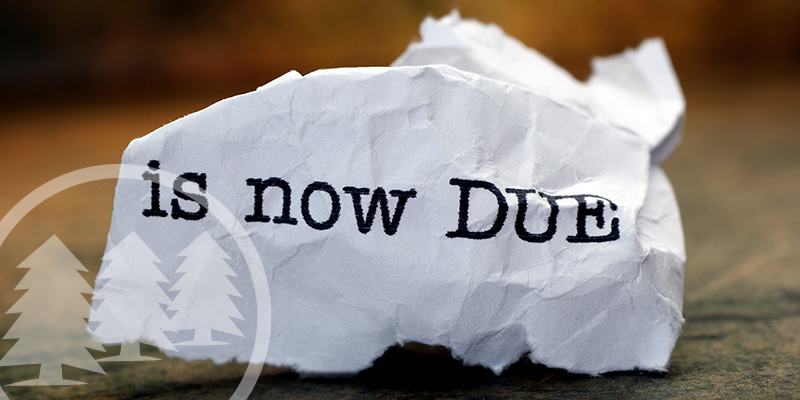Many homeowners associations turn to an HOA collection agency to solve their problems with delinquencies. But, is it really worth your association’s time and money to hire a third party?
Does Your Association Need an HOA Collection Agency?
One of the biggest problems most homeowners associations face is a high delinquency rate. Associations rely on member dues to continue operations and fund maintenance work. When members default on these payments, it can give rise to more issues.
First of all, for a majority of homeowners associations, HOA dues are how they make money. When members refuse to pay HOA fees, the operating fund dries out. As expenses keep coming in, the money to pay for them has to come from somewhere. And, for many HOAs, that means charging special assessments.
This creates an unfair structure, though, for paying homeowners. Members who default on their dues are also unlikely to pay the special assessment. Therefore, in essence, other homeowners — the ones who religiously keep up with their payments — are forced to cover non-paying homeowners.
A second option that many HOAs go with is taking out a loan. But, this is only a temporary solution, as the association will still need to repay the loan amount (plus interest) in the future. Where will that money come from? Again, from the homeowners.
There are several ways an association can reduce delinquencies, and one of them is by employing an HOA collection agency.
The Benefits of Hiring an HOA Collection Agency
 Third-party collection agencies offer many advantages to homeowners associations. As a member of your HOA board, you probably have more important issues to attend to.
Third-party collection agencies offer many advantages to homeowners associations. As a member of your HOA board, you probably have more important issues to attend to.
Everything from budget preparation to architectural change approvals falls on your to-do list. The last thing you want to deal with is collecting past due fees from stubborn homeowners. When it comes down to it, recruiting an HOA collection agency is just easier and less time-consuming.
Another obvious benefit is expertise. Collection agencies have years of experience doing what they do, so they already know what methods and strategies work and what don’t. They go through different training sessions and understand the dunning process better than you do. Plus, these agencies usually know what laws apply to them and have procedures in place that protect them and your association from possible liability.
One thing that many associations consider a huge drawback is the cost of commissioning an HOA collection agency. You might think that it makes more financial sense to collect delinquent dues yourself, but outsourcing HOA collections is actually more cost-effective in the long run. Sure, they typically keep a portion of the collected dues as payment or charge a flat rate in exchange. But, when you really think about it, a collection agency is beneficial to your HOA because they lower your delinquency rate.
For example, if your association has $10,000 in delinquent dues and the agency keeps 10 percent, you are still looking at $9,000 worth of collected dues. As opposed to $10,000 in uncollected dues, it is infinitely better to collect $9,000 and pay the agency $1,000 as a fee.
In some instances, your association may have the ability to charge the collection costs to the delinquent homeowners. That means the non-paying member will have to shoulder the collection agency fee. Make sure to check your state laws and governing documents to see if your association has the power to do this.
The Downsides of Third-Party Collections
As with a lot of things, there are also downsides to employing an HOA collection agency, but these usually have to do with the quality of service they provide. If the agency has poorly trained employees who lack good communication skills, then you run the risk of upsetting delinquent homeowners. An agency may also fail to follow HOA collection laws and embroil your association in liability. Apart from that, collection agencies usually juggle plenty of clients, which means your association may not be a priority.
You can easily avoid these problems, though, with the help of a thorough vetting process. When considering candidates, make sure to check their credentials and licenses. Ask what sort of training they provide to their employees and how they keep up with ever-changing collection laws. Request references and personally contact them to learn about their experiences. It is also a good idea to check reviews online.
Understanding the Fair Debt Collection Practices Act
The federal Fair Debt Collection Practices Act, also known as the FDCPA, was designed to protect consumers from unfair collection practices and regulate collection agencies. Under this Act, dues are considered debts, collection agencies are considered debt collectors, and homeowners or HOA members are considered consumers. But, the Act does not consider homeowners associations as debt collectors. As such, the FDCPA does not apply to HOAs collecting their own unpaid dues or debts.
In addition to prohibiting unfair, abusive, and misleading practices, the FDCPA mandates debt collectors to disclose certain information when sending the first demand letter or dunning notice. Such information includes the debt amount and the identity of the creditor. The letter must also indicate that the consumer has a right to debt verification.
Debt collectors must include this information in any type of communication provided to the consumer within five days of initial contact. Furthermore, debt collectors should constantly introduce themselves as such in every instance of communication.
Keep in mind that most states also have their own laws regulating debt collection practices, so make sure to check your own as well. More importantly, while the FDCPA does not consider HOAs as debt collectors, some state laws (such as those of North Carolina and New Hampshire) do.
The Case for HOA Management Companies
Many associations employ an HOA management company to take care of the day-to-day operations of the community. Oftentimes, this includes homeowners association dues collection, though not all companies offer that service.
If you already have an HOA management company that provides HOA dues collection services, you might consider leaving the task to them instead. These companies are also well-versed in dues collection as well as federal and state laws. Using their services may be more cost-effective than hiring a separate HOA collection agency.
As for whether or not HOA management companies are considered debt collectors under the FDCPA, it really depends on the situation. Generally, if the company uses most of its time to collect delinquent dues, then a court might consider the company as a debt collector. But, if unpaid dues collection only takes up a small portion of its time, a court may not deem the company as such.
Alternative Means to Include in Your HOA Collection Policy
Besides employing an HOA collection agency, your association should also consider other ways to collect dues. Here are some methods you can use when figuring out how to collect delinquent HOA dues:
 Send a Notice of Delinquency. When a member’s dues become past due, HOAs usually send a notice to let the member know of the debt. The format of this notice as well as its contents can vary from association to association, depending on what their governing documents say.
Send a Notice of Delinquency. When a member’s dues become past due, HOAs usually send a notice to let the member know of the debt. The format of this notice as well as its contents can vary from association to association, depending on what their governing documents say.- Impose Late Fees. As a way to discourage late payments, you can charge late fees to delinquent homeowners. Make sure state laws and your CC&Rs or bylaws permit you to do so, though.
- Enter an HOA Payment Plan Agreement. A payment plan is a good way to give struggling homeowners some room to breathe while still earning income for the association. In some states (such as Colorado), a payment plan is even mandatory.
- File a Lien and Foreclose. In most cases, an HOA can attach a lien to the property of the delinquent member and then subsequently initiate foreclosure proceedings.
Is an HOA Collection Agency the Way to Go?
Given the role HOA dues play in communities, collecting them on time and in full remains a critical part of your job. Not all homeowners, though, are in good standing of their dues, and a simple delinquent HOA dues letter is often not enough. An HOA collection agency can help reduce the number of delinquencies in your association. Just make sure to go through a rigorous screening process to ensure you end up with an effective and law-abiding agency.
Does your homeowners association need help? Contact Cedar Management Group today. In addition to dues collection, we also offer accounting services, reserve planning, board education, and community management, among other things. Call us at (877) 252-3327 or get in touch with us online to request a proposal.
RELATED ARTICLES:
- What Every Board Member Should Know About HOA Collections
- HOA Collections And The Fair Debt Collection Practices Act
- What Is An HOA Fee? What Does It Cover?






